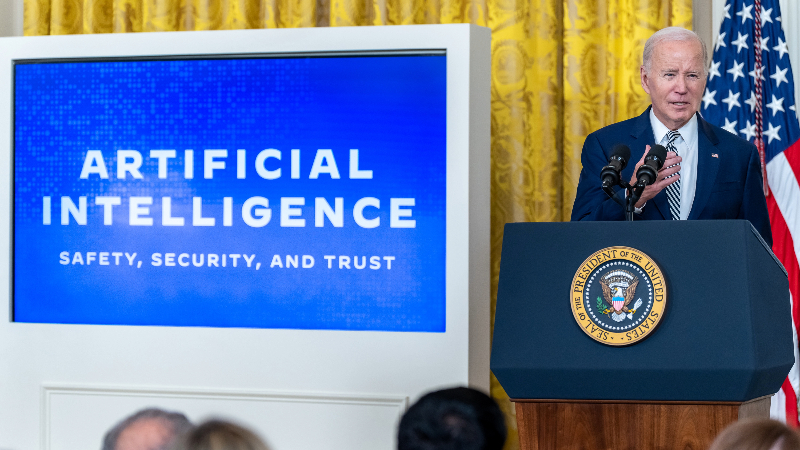
The White House announced a new framework today that aims to maintain U.S. leadership in AI by keeping advanced computing chips and AI models under the control of the United States and its allies.
However, the “Interim Final Rule on Artificial Intelligence Diffusion” also drew criticism from industry executives, who say the new rule will derail AI progress and stifle technology innovation in America.
According to the White House, the rule will streamline licensing hurdles for chip orders, raise AI security standards, and provide clarity to allied and partner nations about how they can benefit from AI. The Commerce Department’s Bureau of Industry and Security will enforce the rule.
“This policy will help build a trusted technology ecosystem around the world and allow us to protect against the national security risks associated with AI, while ensuring controls do not stifle innovation or U.S. technological leadership,” Secretary of Commerce Gina Raimondo said in a statement.
Eighteen key allies and partners will be exempt from the rules, while about 120 other countries will face caps on chip sales. Countries of concern, such as China, will be completely restricted from receiving the technology.
Chip orders with a collective computation power of up to about 1,700 advanced graphics processing units (GPUs) – which are used to train AI models – do not require a license and do not count against national chip caps.
Entities that meet high security standards and are headquartered in allied nations can obtain highly trusted “Universal Verified End User” (UVEU) status. This means they can then place 7 percent of their global AI computational capacity in countries around the world.
Additionally, entities that meet the same security requirements and are headquartered anywhere that is not a country of concern can apply for “National Verified End User” status. This will allow them to purchase computational power equivalent to up to 320,000 advanced GPUs over the next two years.
The White House said non-verified entities located outside of close allies can still purchase large amounts of computational power, up to the equivalent of 50,000 advanced GPUs per country.
The rule also institutes new controls on the “model weights” of the most advanced “closed-weight AI models.” Model weights help to determine the decision-making of an AI model.
The regulation is set to take effect 120 days from publication, meaning the Trump administration will ultimately have the opportunity to determine the rules.
The rule drew criticism from many industry groups and AI companies, including NVIDIA – the world’s leading manufacturer of AI chips.
“In its last days in office, the Biden administration seeks to undermine America’s leadership with a 200+ page regulatory morass, drafted in secret and without proper legislative review,” Ned Finkle, the vice president of government affairs at NVIDIA, said in a Jan. 13 blog post.
“This sweeping overreach would impose bureaucratic control over how America’s leading semiconductors, computers, systems, and even software are designed and marketed globally,” Finkle added. “And by attempting to rig market outcomes and stifle competition – the lifeblood of innovation – the Biden administration’s new rule threatens to squander America’s hard-won technological advantage.”
NVIDIA hints that it is looking forward to the incoming Trump administration, noting that the first Trump administration demonstrated that “America wins through innovation, competition, and by sharing our technologies with the world – not by retreating behind a wall of government overreach.”
“We look forward to a return to policies that strengthen American leadership, bolster our economy, and preserve our competitive edge in AI and beyond,” Finkle concluded.
The Semiconductor Industry Association (SIA) also expressed its disappointment with the interim final rule.
“We’re deeply disappointed that a policy shift of this magnitude and impact is being rushed out the door days before a presidential transition and without any meaningful input from industry,” SIA President and CEO John Neuffer said in a statement. “The new rule risks causing unintended and lasting damage to America’s economy and global competitiveness in semiconductors and AI by ceding strategic markets to our competitors.”
“The stakes are high, and the timing is fraught. We stand ready to work with leaders in Washington to chart a path forward that protects national security while allowing us to do what America does best – compete and win globally,” Neuffer said.
Nevertheless, other organizations such as Americans for Responsible Innovation (ARI) praised the rule, calling it a common-sense security step.
“We wouldn’t send the blueprints for our most advanced missiles to countries collaborating with China, and we shouldn’t send the blueprints for our most advanced AI there either,” said ARI President Brad Carson. “This is national security 101. There’s still work left to do updating export controls to account for open AI models, but this is a big step forward.”
Comments on the rule are “strongly encouraged” by the Commerce Department and are due 120 days from its publication.
